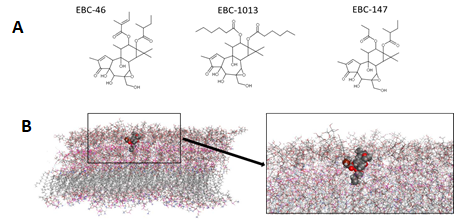Duration: 16 months
Partners: QBiotics and Cardiff University (Clinical Innovation Acceleration (CIA))

Project overview
The use of antimicrobials to inhibit growth or kill microorganisms/ microbes, has had a significant impact upon worldwide health improvements. However, the inappropriate use of antimicrobial drugs such as antibiotics, has led to microbes adapting and developing resistance. This is known as antimicrobial resistance (AMR),and can occur in bacteria, viruses, fungi and parasites.
A collective of these microbes can lead to a formation of a biofilm, whereby the microbes stick to each other and adhere to a surface. Bacterial biofilms are associated with around 80% of chronic infections and non-healing wounds in humans, and these ”sticky” biofilms provide a resistance against drugs such as antibiotics. To mitigate this, therapeutic interventions have explored ways to prevent or disturb the formation of biofilms and facilitate drug delivery into these biofilms. Advances in this field are helping to address a significant clinical problem, which ultimately improves the outcomes for patient with complex wounds and chronic infections.
Queensland’s tropical rain forest is home to a variety of indigenous species of tree. This project examines the role of novel therapeutics derived from products of this tropical environment (epoxy-tiglianes) and explores their anti-biofilm action.

Accelerate’s involvement
Accelerate is supporting the delivery of this collaborative project between QBiotics and the Advanced therapies Group and the Division of Infection and Immunity at Cardiff University.
The project is being delivered through the clinical and academic expertise from Cardiff University working in parallel with the industrial expertise of QBiotics. This team will undertake the work needed to explore the mechanism of action behind the leading compound (EBC-1013) in breaking down antibiotic-resistant biofilms and boosting the immune system of the skin. Such work is anticipated to accelerate the development of appropriate therapies
Expected outcomes
- Defined mechanisms of action of EBC-1013 at a molecular and cellular level
- Integration and connections within the Welsh life-science ecosystem - facilitating expansion into Wales
- Opportunities for further collaboration between project partners
- Case studies
-
Peer reviewed publications.
Potential future outcomes
- Market advantage to QBiotics with support of new IP filing
- Improved understanding of mechanism of action to support licensing and regulatory discussions
- Regulatory approval of EBC-1013 for use to improve the healing of chronic wounds will potentially have huge impact on patient care
- Reduction of unnecessary animal experimentation in development of their “pipeline”
- Economic growth in Wales through proposed company expansion
This project is part of the Accelerate programme which is part-funded by the European Regional Development fund, through Welsh Government.

